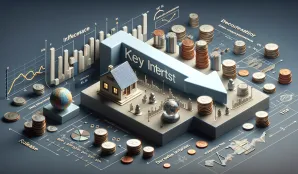Swedens Policy Rate
- Articles
- Swedens Policy Rate

The Swedish Riksbank and the possibility of zero interest Rates
In recent days, discussions about the Riksbank's monetary policy have gained new momentum. Considering the economic developments and the latest signals from the Riksbank, there seems to be an opening once again for interest rates to be lowered to zero percent. This could be a step to address the economic challenges that Sweden and the world are currently facing.
Recent interest rate cuts and forecasts
When the Riksbank lowered the policy rate by 0.25 percentage points to 3.25 percent in September 2024, it was a clear sign of the concern for both the economy and inflation. The latest cut in November 2024 brought the rate to 2.75 percent, and according to forecasts from several major banks, including Swedbank, Nordea, and SEB, we can expect further cuts to 2.5 percent before the end of the year, with a possible continuation down to 2.0 percent in 2025. These forecasts indicate that the central bank is ready to be flexible and act to adapt to the economic developments.
History and lessons from previous zero interest rates
Historically, the Riksbank has used zero interest rates as a tool to stimulate the economy and achieve the inflation target of 2 percent. During the period from 2020 to 2022, the policy rate was kept at zero percent to support the economy during the pandemic and combat low inflation. It was a time of great uncertainty as the pandemic led to declining demand, prompting the Riksbank to act decisively. The significant government support packages combined with very low interest rates helped avoid a severe recession and kept unemployment in check.
Current economic situation
The current economic situation has, of course, other underlying causes, but the similarity lies in the uncertainty and the need to find the right balance. Sweden, like many other countries, has been affected over the past year by a mix of high inflation and declining growth rates. Although inflation in Sweden has started to ease from its previous peak levels, the problems of rising costs for households and businesses persist. Keeping mortgage rates low and easing the burden on Swedish households could be a strong reason for the Riksbank to consider further rate cuts.
International economic impact
While we see these discussions about zero interest rates again, the international economic developments also play a significant role. The European Central Bank (ECB) has signaled a more cautious stance, and the Federal Reserve in the US has begun considering slowing down its rate hikes. This global shift towards a more expansionary monetary policy could have implications for Sweden as well. If our trading partners reduce their rates, it could put pressure on the Riksbank to act similarly to avoid an overly strong krona, which could harm Swedish exports.
Impact on households and risks
Over the past year, households' confidence in the economy has been weak, negatively affecting consumption. A reduction to zero interest rates could provide a much-needed boost to the domestic economy by increasing households' purchasing power and lowering mortgage costs. Mortgage rates are especially important for many Swedes, and with a potential zero interest rate, it would mean lower monthly expenses for millions of households, which in turn could lead to increased consumption.
But despite the potential benefits of zero interest rates, there are also risks. A low rate could lead to increased indebtedness, making households more vulnerable to future rate hikes. Additionally, there is a risk that the housing market could start overheating again, creating imbalances in the economy in the long run. It is a delicate balance for the Riksbank to manage – supporting the economy without creating long-term risks.
Riksbank's flexibility and future decisions
The Riksbank has emphasized that their decisions are always based on current economic conditions, and that monetary policy needs to be flexible. Maintaining a zero interest rate is therefore not an end in itself, but rather a tool that can be used if the economic situation requires it. Currently, it is clear that we are in a period where flexibility and adaptability are keywords to address the challenges ahead.
Of course, much can happen in the future, but we can be sure that the Riksbank is prepared to act to keep the economy stable. The decision to return to zero interest rates is not taken lightly, but it is a possibility that can no longer be ruled out given the current economic uncertainty.
Sweden's national debt
-
 Municipality
MunicipalityTax Pressure in Kiruna Municipality - An Overview of Tax Rates and Economic Challenges
Thu, 23 May 2024 - 22:26
-
 Swedens Policy Rate
Swedens Policy RateThe Swedish Riksbank and the possibility of zero interest Rates In recent days, discussio
Thu, 28 Nov 2024 - 14:55 -
 Swedens Policy Rate
Swedens Policy RateThe Central Bank Lowers the Policy Rate to 2.75%: What Does It Mean for Your Wallet? On November
Thu, 7 Nov 2024 - 09:09 -
 Swedens Policy Rate
Swedens Policy RateNew announcement from the Central Bank: Key interest rate lowered to 3.25% The Central Bank has tod
Thu, 26 Sep 2024 - 15:28 -
 Swedens Policy Rate
Swedens Policy RateThe Central Bank lowers the policy rate to 3.5%: What does it mean for households? On August 20, 2
Tue, 20 Aug 2024 - 14:00 - Show more ->
















